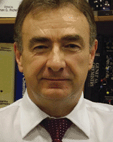DOI: 10.1039/C2CC90092K
(Profile)
Chem. Commun., 2012, 48, 4657-4658
Interview with Robert Mulvey
| ||||||
Do you remember what it felt like to publish your first ChemComm article?
I certainly do as it (DOI: 10.1039/C39840000079) was my first ever paper. It was also the start of a tremendous sequence of publications in ChemComm for our group as we had seven in a row published in 1984. We all felt elated, like we had just won the Champions League, especially as we were a very small inexperienced team with the late Ron Snaith managing myself and Donald Barr, his first PhD students. I have been fanatical about research chemistry and publishing papers ever since.How has your research evolved from your first to your most recent article?
The first paper described the synthesis and structures of organonitrogen-lithium compounds. I still retain a great fondness for organolithium chemistry as its compounds are workhorses of chemical synthesis, they adopt a bewildering array of structures, and are exciting to handle in the laboratory due to their air sensitive/pyrophoric nature. My early work taught me a lot about the mechanics of structures, which I am now exploiting to design new bimetallic molecular architectures that can exhibit novel chemistry due to cooperative effects between the distinct metals involved.What do you like most about publishing in ChemComm?
The community in general regards ChemComm extremely highly so it is a benchmark of the quality of your research if you are fortunate enough to have papers published regularly in the journal. Also, the whole process from submission to decision through to publication seems to run like clockwork. The journal is also attractively presented though I do miss the old green reprints.What aspect of your research are you most excited about at the moment?
I am particularly intrigued by the largely untapped power of cooperative effects in organometallic chemistry. We have recently shown how zinc compounds which are useless bases on their own can be transformed into superbases by combining them with sodium compounds. Turning conventional chemistry on its head, while sodium reagents are normally orders of magnitude more reactive than zinc reagents, in this cooperative chemistry it is zinc that performs deprotonations while sodium merely spectates.What is the best part of your job?
I especially appreciate that an academic career gives the opportunity for you to express your originality and creativity, whether it be in devising new projects, designing new experiments, or drafting new manuscripts. I also enjoy teaching and mentoring and have been lucky to work with many talented young researchers down the years.What is the secret to success in scientific publishing?
Hard work and an engaging writing style is the key. I have not come across any leading scientist who does not have a strong work ethic. Also manuscripts should be thoroughly checked before submission as they should always be immaculately presented.What is your advice to young emerging scientists?
Don't lose heart as it is inevitable that you will experience many disappointments (experiments that go wrong; grants unfunded; papers rejected) along the academic roller-coaster. However a lifelong career in science will be exciting and rewarding, and, not least, gives you the opportunity to contribute to society.What do you do in your spare time?
I love travelling, seeing new places and meeting new people. A typical Glaswegian, I also get away from it all by watching my football team Celtic play at home every second weekend.By the time I'm 100 I would like to have……
....uncovered many more cooperative effects in polynuclear systems or pioneered the use of organolithium compounds in water or found a way to make lithiation reactions totally catalytic. I think the last two aspirations in particular would revolutionise chemistry and lead to many socioeconomic benefits.| This journal is © The Royal Society of Chemistry 2012 |

